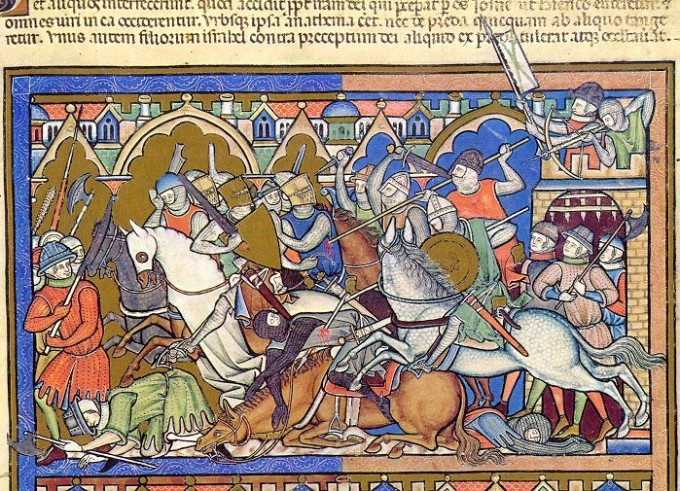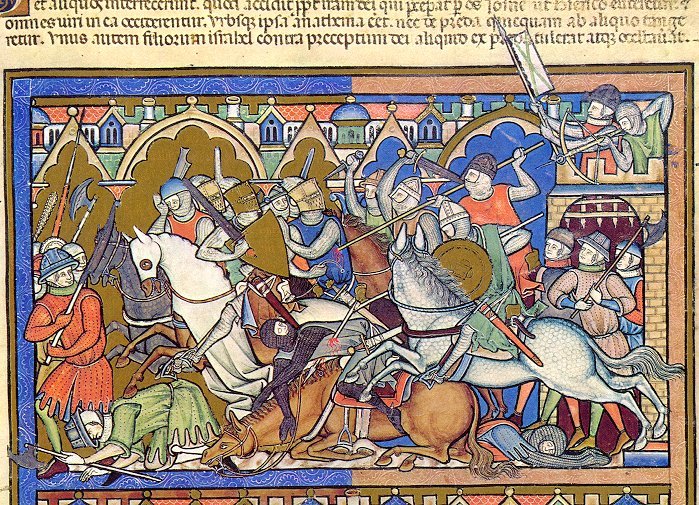From “Thou Shalt Not Kill” through “God Wills It!” and Beyond: The Inevitable Arc of Changing Christian Attitudes Towards War
By Del Stewart
Master’s Thesis, American Public University System, 2014

Abstract: The following is a unique interpretation of the development of Christian Just War theory, and other Christian attitudes towards war and killing, which holds the following points:
• Christian attitudes towards war and the State-sanctioned taking of human life are both linked to the State position regarding capital punishment;
• Christian attitudes towards war largely developed from Jewish thought, but did so in an almost mirror image over time, ending with the Holy War (and arguably its apex of the Crusade).
• Christianity as a religion essentially changed from a religion of individual Salvation, to include group conversion, to a religion which served the State as both Church and State became more intertwined.
Note that the Holy War terminology, which was the original position taken by the peoples and religions of Mesopotamia and Egypt, preceded yet overlapped for a time with Judaism. However, Judaism used different principles, thoughts, and terminology to describe its wars. This terminology included the concepts of commanded wars, discretionary (permitted) wars, and obligatory wars.


 Introduction: This treatise covers from the surviving fragments of written culture in the Mesopotamian region, circa 3500 BCE, to approximately CE 1500. The wording of the title seeds the idea of an evolving theology, and offers the anchor that this arc, passing as it did (and does) through many different interpretations and doctrines, was grounded in something – and as will be shown, that model was Jewish thought. Ironically, as Judaism evolved from a doctrine where God commanded their wars to a view that life was sacred, Christianity started with the view that life was sacred, and then evolved towards the direction of holy war and crusade. The weight of more than 3,350 years of pre-Christian historical focus upon the holy war, by whatever name or terminology, exerted an inexorable influence, and eventually brought Christianity to the position of reinforcing the objectives of the state(s) for which it served as the official religion.
Introduction: This treatise covers from the surviving fragments of written culture in the Mesopotamian region, circa 3500 BCE, to approximately CE 1500. The wording of the title seeds the idea of an evolving theology, and offers the anchor that this arc, passing as it did (and does) through many different interpretations and doctrines, was grounded in something – and as will be shown, that model was Jewish thought. Ironically, as Judaism evolved from a doctrine where God commanded their wars to a view that life was sacred, Christianity started with the view that life was sacred, and then evolved towards the direction of holy war and crusade. The weight of more than 3,350 years of pre-Christian historical focus upon the holy war, by whatever name or terminology, exerted an inexorable influence, and eventually brought Christianity to the position of reinforcing the objectives of the state(s) for which it served as the official religion.
The focus of this inquiry is primarily upon Europe and the Middle East in terms of geography, and indirectly Africa, insofar as various lands were under Roman rule and Christianity dispersed throughout the empire. Discussions of Judaism are only for the sake of illumination vis-à-vis Christianity, and not exhaustive, while any consideration of Islam is even more truncated. Protestantism emerged much later than Catholicism and Greek Orthodox teachings, thus covered the same ground in terms of theory, offering only one compromise position: non-violent participation, explained below.
Click here to read this thesis from Academia.edu
Sponsored Content


From “Thou Shalt Not Kill” through “God Wills It!” and Beyond: The Inevitable Arc of Changing Christian Attitudes Towards War
By Del Stewart
Master’s Thesis, American Public University System, 2014
Abstract: The following is a unique interpretation of the development of Christian Just War theory, and other Christian attitudes towards war and killing, which holds the following points:
• Christian attitudes towards war and the State-sanctioned taking of human life are both linked to the State position regarding capital punishment;
• Christian attitudes towards war largely developed from Jewish thought, but did so in an almost mirror image over time, ending with the Holy War (and arguably its apex of the Crusade).
• Christianity as a religion essentially changed from a religion of individual Salvation, to include group conversion, to a religion which served the State as both Church and State became more intertwined.
Note that the Holy War terminology, which was the original position taken by the peoples and religions of Mesopotamia and Egypt, preceded yet overlapped for a time with Judaism. However, Judaism used different principles, thoughts, and terminology to describe its wars. This terminology included the concepts of commanded wars, discretionary (permitted) wars, and obligatory wars.
The focus of this inquiry is primarily upon Europe and the Middle East in terms of geography, and indirectly Africa, insofar as various lands were under Roman rule and Christianity dispersed throughout the empire. Discussions of Judaism are only for the sake of illumination vis-à-vis Christianity, and not exhaustive, while any consideration of Islam is even more truncated. Protestantism emerged much later than Catholicism and Greek Orthodox teachings, thus covered the same ground in terms of theory, offering only one compromise position: non-violent participation, explained below.
Click here to read this thesis from Academia.edu
Sponsored Content